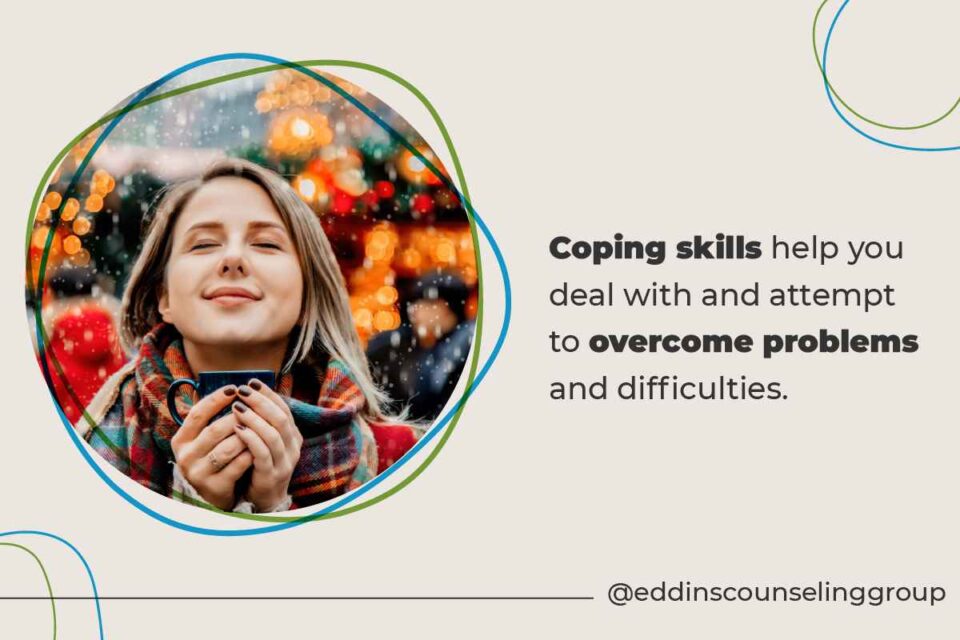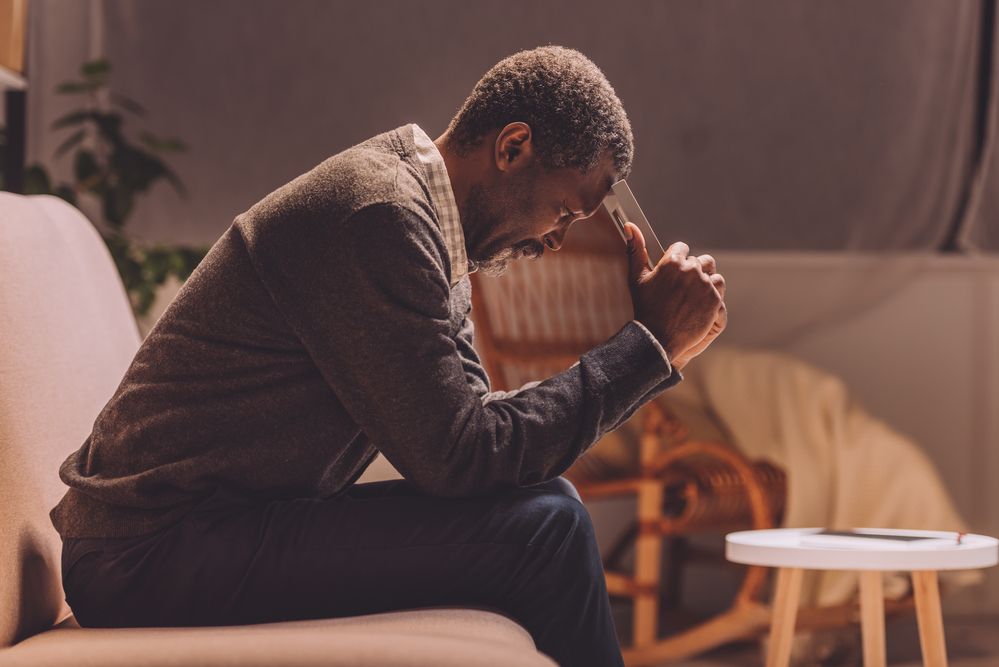December 6, 2020
Coping Skills for Family, Food, and Stress During the Holidays
Written by Rachel Eddins
Posted in Emotional & Mental Health, Stress Management and with tags: Holidays, coping skills, mental health

What coping skills will you use to survive – and thrive – this holiday season?
Our therapists recognize the holiday season to be stressful, no matter what holiday you find yourself celebrating.
There is a lot of preparation, planning, adjusting, and executing involved during this time of the year, and that’s not even considering your usual responsibilities.
So our counseling group developed these coping skills to help you through this holiday season with your mental health intact!
Table of Contents
This post covers a myriad of issues that you may face in the coming weeks. How are you coping this season? What difficulties do you face?
Here are the subjects covered in this post; you will find more on each topic below.
- What Are Coping Skills? Two Kinds of Coping Skills.
- How to Deal with Difficult Family Members.
- Coping with Rejection and Loneliness.
- Food Challenges.
- Being an Introvert.
- Coping with Holiday and Non-Holiday Related Stress.
The holiday season is a time of connection, celebration, and tradition. Yet, it can also be a time of increased stress, overwhelm, or loneliness.
If these tips and coping skills aren’t enough, consider scheduling an appointment with our team.
What Are Coping Skills?
To cope is “to deal with and attempt to overcome problems and difficulties,” Merriam-Webster states. Sarah McLeod with Simply Psychology says that there are plenty of ways humans can deal with stressful conditions or cope.
Stress results from “a discrepancy between the physical or psychological demands of a situation and the resources of his or her biological, psychological or social systems.”
Yet, the capability to cope relies on a few factors, including the type of person you are, the kind of stress you are facing, and any other factors weighing on the situation.
There are two types of coping skills.
1. Emotion-Focused Coping Skills
When coping is targeted at the emotional response brought on by the stressor. Though these sorts of mechanisms are effective when handling circumstances out of your control, they can be problematic because they don’t focus on the stressor’s cause.
The issue is the avoidance of dealing with the issue at hand. This strategy generally resulted in poorer health outcomes because it allowed people to avoid dealing with the actual problem.
Examples include distraction, comfort food, drug use, suppression, etc.
2. Problem-Focused Coping Skills
In contrast to its predecessor, problem-focused coping mechanisms look at the opposite end of a stressor; its source—the problem. Whatever hurdle you may be facing, with this coping mechanism, you start by facing it.
McLeod mentions three strategies used “to remove or reduce the cause of the stressor.”
1. Problem-solving
2. Time-management
3. Obtaining instrumental social support
She explains how this method is just a better coping skill, as it removes emotion from the response.
It “deals with the root cause of the problem, providing a long term solution.”
As we go through different stress-inducing scenarios you may encounter in the coming weeks, try to keep these differences in mind.
Coping Skills for Dealing with Family
We hope this is a time of connection. But that may be difficult if you are coping with family issues.
Considering that people spend more time with families during the holidays than at any other time of the year, even the most loving families may encounter some friction.
Here are some strategies for handling such an event. We want you to enjoy the end of this year, it’s been an especially hard one, and unnecessary arguing will bring no joy.
So, with a little planning, you could get through the season free of new feuds or conflict. Take what works for you and your situation, leave the rest.
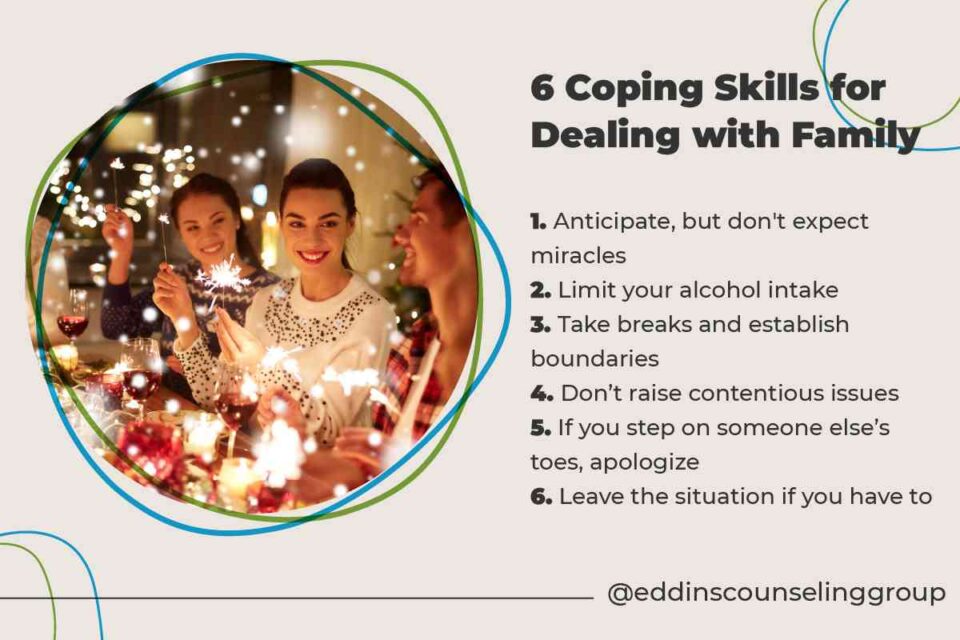
-
Anticipate, but don’t expect miracles
Think about the most challenging situations, the most difficult people, and timeframes. Develop a plan. Have contingencies in place just in case. But be aware that unrealistic expectations only set us up for disappointment.
-
Limit your alcohol intake.
You’re better able to adapt if your brain is working at its best and your ability to inhibit inappropriate actions intact. If another person’s drinking is likely to make things worse as time goes on, plan your exit.
-
Take breaks and establish boundaries.
Take a walk, or take a book to read when you’ve reached your limits. If necessary, claim that there is a phone call you need to make. Avoid subjects using “I” statements.
-
Don’t raise contentious issues.
Politely decline to engage if someone else brings one up.
-
If you step on someone else’s toes, apologize.
Like the adage to treat others as you’d like to be treated, apologies included.
-
Leave the situation if you have to.
You do NOT have to stay.
Decide what conversations you do and don’t want to have. Pick your battles. Remember that, even though they are family, they don’t have a say. Prioritize yourself this holiday season.
Then, with planning, attention, and restraint, we can make the holidays go as smoothly as possible. And sometimes, we even get to savor the gifts of food and connection with people we love.
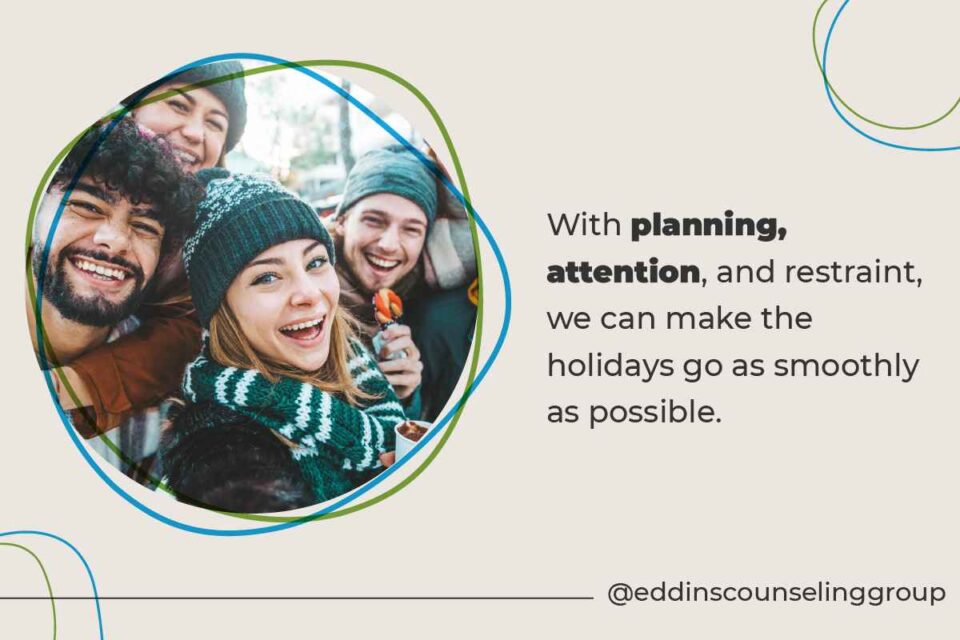
Coping with Rejection & Loneliness
Sometimes being with family causes us to self-evaluate in negative ways.
We compare ourselves to relatives who are more classically “successful,” “good looking,” or at a stage of life that we might wish to be in.
Other times, family members will kindly (or not so kindly) remind us of our shortcomings. And if we don’t have close family, watching others connect with their loved ones can make us feel left out and lonely.
But you can feel lonely for all sorts of reasons. You might have just experienced a breakup.
Maybe you have to spend this holiday apart from your loved ones.
You may have just lost someone, and you feel the intense weight of that loss this time of year.
Loneliness is a subjective deep feeling of emotional or social disconnection. You can be surrounded by people and still feel lonely. Family members can talk with you, and you can still feel lonely.
The downside is that if you feel rejected, misunderstood, or unloved; it can increase your tendency to isolate or withdraw (leading to greater feelings of loneliness). It’s important to go against that instinct, which can also give you a break from negative thoughts.
5 Coping Skills for Food Challenges
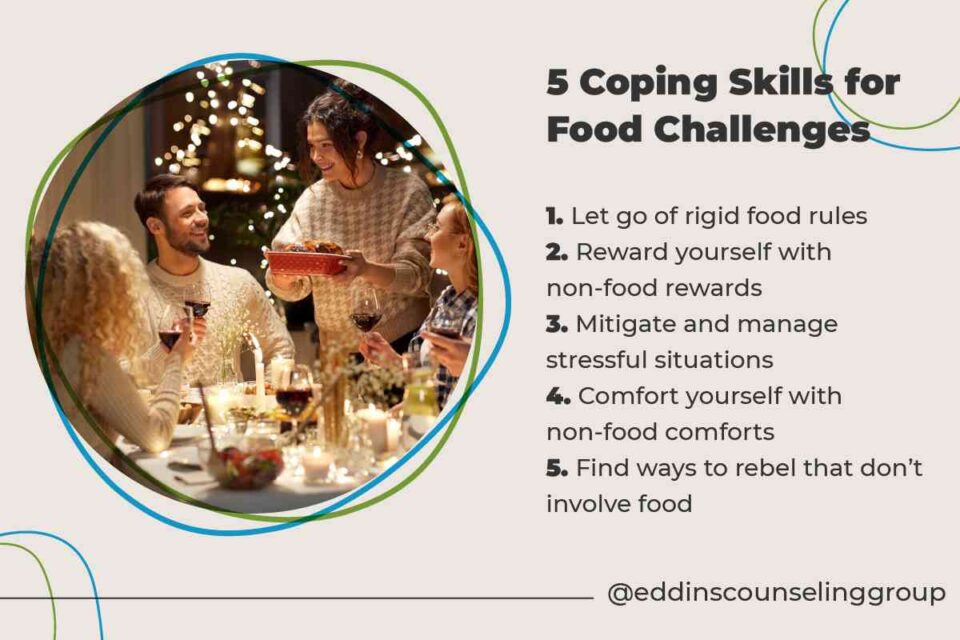
If the family is difficult, food can be an even harder subject to broach. Our relationships with food can be a tumultuous one. We rely on it for sustenance, but sometimes we may use it for a different kind of fill.
If you struggle with any unique food challenges or unhealthy coping mechanisms related to food, try these therapist-approved strategies.
-
Let go of rigid food rules.
Eating is a big part of the traditions and celebrations that happen this time of year. You should feel free to enjoy it. This isn’t permission to overindulge, but it is permission to relax around food, especially if you are prone to guilt or shaming yourself.
-
Reward yourself with non-food rewards.
The holidays are a time where we celebrate the triumphs of the year, relax our boundaries, embrace what is to come.
So, at the end of the night, you may fall into the trap of rewarding yourself with food after all your hard work, which is tempting, but it can create some rather unhealthy habits.
Try rewarding yourself with non-food items and activities. Indulge in self-care or a new outfit rather than comfort food. You may be surprised at how much you enjoy it.
-
Mitigate and manage stressful situations.
Traditions and gatherings and celebrations may look a little different this year, and that’s not such a bad thing. Some of the holiday staples are stressful.
If you anticipate certain plans to be more stress-inducing than cheer inducing, make it work for you and your needs. Maybe you ask for help, but if it’s really just too much, you should always feel free to cancel. This year isn’t going to be easy no matter how you slice it, so don’t sweat it.
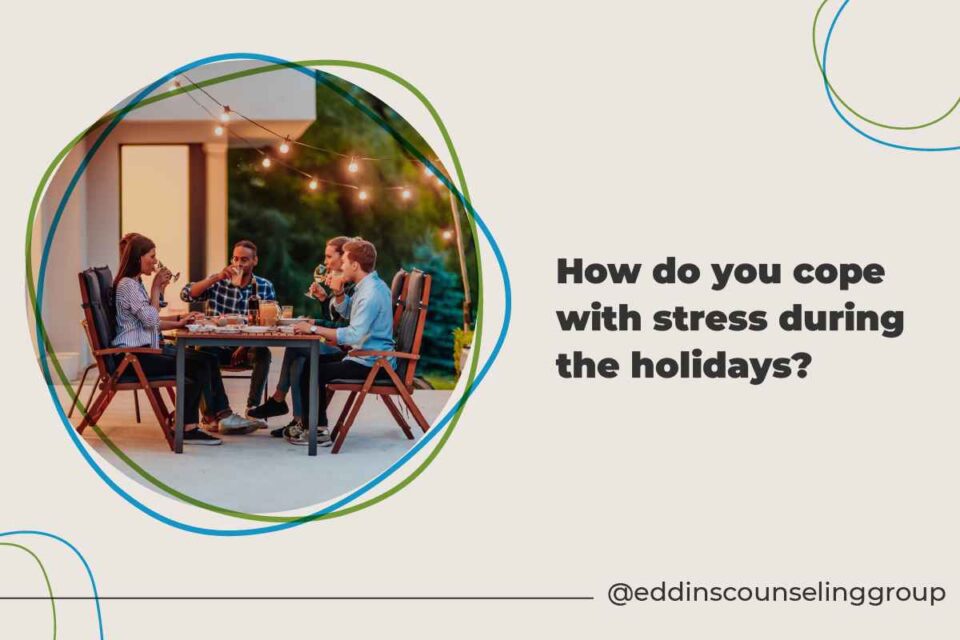
-
Comfort yourself with non-food comforts.
In hard or uncomfortable situations, we seek comfort. But if you find yourself looking for comfort in food or alcohol to feel better, consider avoiding coping with these as they may lead to maladaptive coping styles.
Perhaps instead of comforting yourself with food, you seek comfort in a movie you adore.
Practice comforting activities like meditating, reading, a quick nap, or a walk outside when you feel overwhelmed, as these are much more productive and healthy coping mechanisms.
-
Find ways to rebel that don’t involve food.
This is about deprivation eating, where you deprive yourself for so long that you rebel by eating. To counter this, allow yourself more experiences. Eat sweets. Allow yourself to relish in what you choose to take part in.
Don’t deprive yourself of the experiences the holiday season has to offer.
Read more here about food challenges and coping skills for dealing with them.
A Note on Being an Introvert During the Holidays
Holidays can seem like more of a nightmare.
Socialization, questions, and conversations can be difficult in any circumstance, but they can be even more challenging during the holidays.
Family members can be direct or overwhelming when they are all together. You may feel required to attend social engagements and there may be more than usual.
Ask yourself what you really need during this time of year? What would help you enjoy the company of others in a balanced way?
Do you need to have an exit strategy planned ahead of time? Would it be helpful to give yourself permission to set limits on what you will and won’t attend? Do you need to plan out communication boundaries for challenging conversations? Or perhaps you could suggest activities that focus on what feeds you vs what overwhelms you?
Anticipatory anxiety is no fun. On the other hand, having a plan in advance can help you navigate stressful situations with ease. Even Olympic athletes visualize moving through their course before the big day.
Knowing your personality can help you find the self-care option you need.
List of Coping Skills for Reducing Stress During the Holidays
The holidays are a time of joy and celebration, of giving thanks and connecting with loved ones. For many, however, the holidays can feel lonely, stressful, and joyless.
There’s so much to do for some and reminders of what’s missing for others.
Here are some strategies to help you cope with stress during the holidays.
1. Identify what you want for the holiday season.
Take some time to imagine how you would prefer to spend your time, what activities you enjoy doing, and create holiday cheer for you, which people you enjoy sharing with.
Think about what would make the holiday season special, joyful, or rewarding for you and how you want to spend your time and energy.
You don’t have to do everything. Think of ways you could combine some of your preferences. Could decorating be a fun family event? Could you go shopping with a friend?
2. Take care of yourself physically.

It certainly doesn’t mean depriving yourself.
Rather, it might mean finding the balance between enjoying holiday foods and getting in your fruits and veggies as well. Or going for a walk after a big meal.
It might also mean getting some rest after a day of busyness to give yourself time to relax and unwind.
Get the rest you deserve. Try and find one way to stay in balance each day and avoid the temptation to say, “What the heck, I can rest/exercise/do me tomorrow.”
3. Set realistic expectations for others.
Think back to the past holidays and ask yourself, honestly, how were things really? How are things now? Rather than fixing things and making them better, do what you can and keep your expectations in check.
People won’t suddenly change despite the wonderful presents, cooking, or decorations.
Identify areas you have felt stress concerning others and plan what you could do differently this year, if anything. Your only option might be to set more realistic expectations.
Still, you might also consider having someone to talk to, spending more time with supportive individuals, and limiting time with difficult individuals.
4. Maintain realistic goals.

This doesn’t have to be the “best Christmas ever,” and it’s not likely to be.
There’s no law saying you have to be filled with joy all the time, especially this year.
When you acknowledge that it’s okay to feel low or lonely, you’ve already rid yourself of the shame associated with holiday unhappiness and can move forward honestly.
In fact, in surveys of people’s feelings over the holiday season, over half the responders report experiencing loneliness during this time of year.
So you’re not alone in feeling alone!
Don’t set expectations that don’t consider what this year has brought or taken away from you.
5. Set realistic boundaries for yourself.
What’s your budget? If funds are low, perhaps you can draw a name in the family vs. buying a present for everyone.
Review your past holidays and identify where you’ve gotten stressed. What can you do differently?
If food is a source of stress, could you try to be mindful about your choices and really enjoy each bite until you feel satisfied?
Are there tasks you can cut out this year? Can you aim for “good enough” on the food or decorations vs. “outstanding”? Or maybe you just opt out? And trust that you aren’t a bad parent, neighbor, etc.
It’s easy to get caught up in ideas and plans, all with great intentions. Look to your past to see what is realistic for yourself.
6. Check-in with yourself daily.
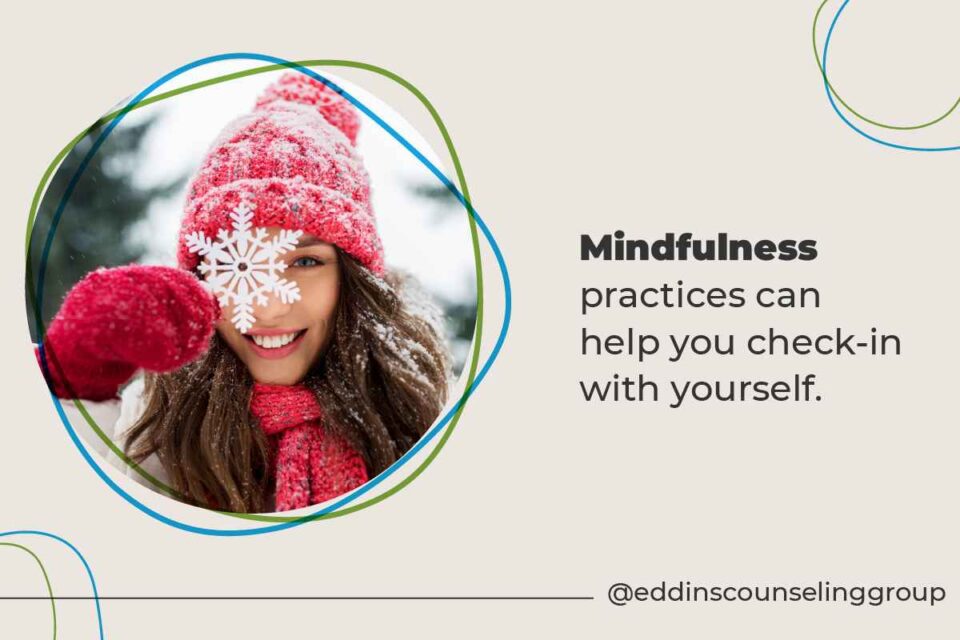
Remember, you are the best expert of yourself. Do the best you can to check in and recognize how you’re doing and what you need.
You might not be able to meet all of your needs, but take some time to at least acknowledge them.
It can be easy to get caught up in the doing without realizing your needs are going unmet. Mindfulness practice can help with this.
7. Nurture gratitude.
Take a moment to notice what you have vs. have not.
Appreciate or even enjoy the simple things.
Expressing gratitude can deepen your connection to the world around you.
Taking a moment to express appreciation, even of something minimal, can make a big difference.
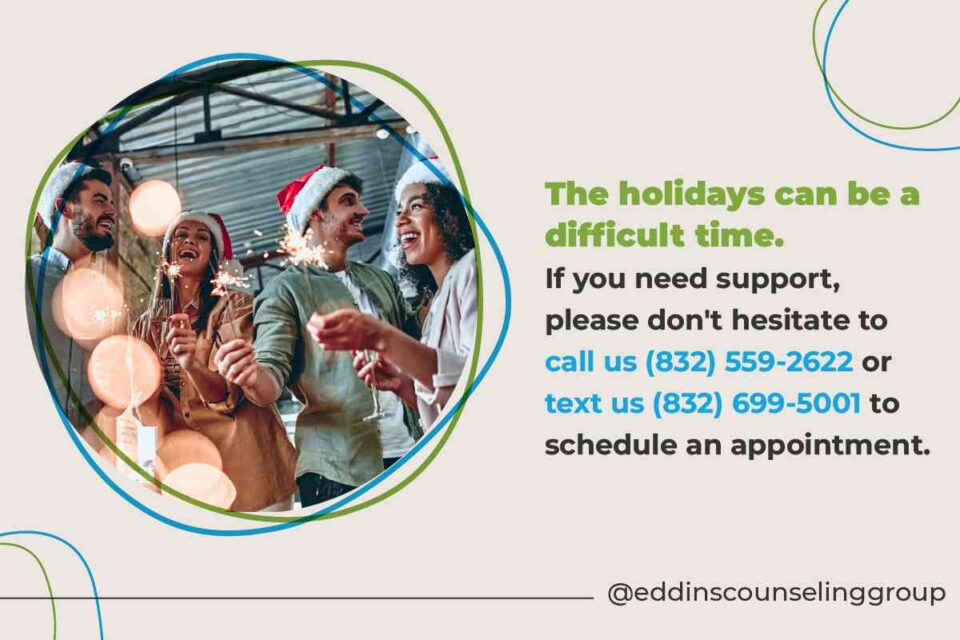
If it’s all too much…
The holidays can be a difficult time. If you need support, please don’t hesitate to contact us, even if you need some short-term processing with a therapist to get through current stressors.
To get started now, call us at 832-559-2622 or schedule an appointment online.
Grounding & Self Soothing
Get instant access to your free ebook.
Why You Feel This Way
Get instant access to your free ebook.

